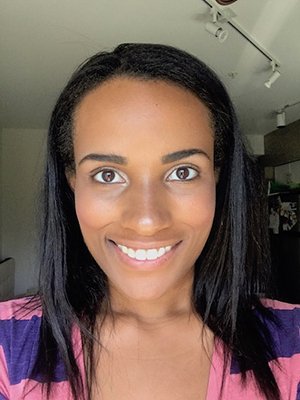With Go-Map Diversity Fellowship Funding, Student's Attention is on Human Attention
 |
Miranda Petty (a Cognition & Perception graduate student with John Palmer) was awarded a recruitment fellowship from the Graduate Opportunity and Minority Achievement Program (GO-MAP) of the Graduate School when she accepted the offer to join the Psychology PhD program last year. This fellowship provides tuition assistance, stipend, health insurance, and makes available the close-knit network of the GO-MAP community. The Psychology Department is very thankful that GO-MAP recognizes gifted students from the onset of their graduate careers. Now that Miranda has entered her second year, we thought we'd ask her a few questions.
Let's start with the basics: where are you from and where did you complete your undergrad degree?
I was born and raised in Louisville, Kentucky. I moved to California after graduating high school, and I completed undergrad at California State University, Fullerton.
How did you wind up at UW and what drew you to apply here? What do you think about living in Seattle?
I chose UW because I felt that it was the best research fit, and everyone in the Psychology department was just so friendly and welcoming. I have also always wanted to live in Seattle; I just had a feeling that I’d like it here, and so far, I love it.
What is your research interest and how did you get into it?
I do research on attention. I became interested in attention research after spending a summer working with Dr. George Alvarez at Harvard University. Attention is a really interesting topic that most everyone has some intuition about. We know what it feels like to try and divide our attention between multiple things, and we realize that some tasks are impossible to complete at once (e.g. we cannot carry on a conversation with someone while also reading a book). Yet there is still a lot that is unknown about the human attentional system, and there are a lot of sophisticated ways to study attention using psychophysics and brain imaging.
What is the name of your project?
The title of my first-year project is “Comparing the Roles of Perception and Decision in Spatial Selective Attention.” This project was funded by Dr. Geoffrey Boynton’s grant from the NIH.
How might your research change the world?
Deficits in the attentional system can have a significant impact on our ability to complete daily tasks. There are some disorders, such as Attentional Deficit Disorder (ADD), that are obviously related to attention, and attention research has done a lot to help us identify the symptoms of these disorders and develop treatments. There are other disorders that are less obviously related to attention. For example, recent research has hypothesized that attention may be related to dyslexia. Research that focuses on how attention is involved in various cognitive tasks will help us to understand the links between attention and cognitive disorders, even those that might not seem obvious.
Do you have any advice/tips/suggestions for others who may apply to this opportunity? About graduate study in general?
I would without a doubt recommend that other people apply for this fellowship and become a part of the GO-MAP community! Not only is it a great funding opportunity, but being involved with GO-MAP and attending the various events and workshops that they organize each year will allow you to connect with a diverse set of people from all over the UW campus. Even if a graduate student decides not to apply, I would strongly suggest they still participate in GO-MAP events. I made so many meaningful connections through GO-MAP that I likely would not have made otherwise.
What do you hope to accomplish with the funding and/or while in the UW Psychology graduate program?
Because of my GO-MAP funding, I was able to complete two experiments for my first-year project, and I am currently in the process of writing a manuscript of this project to submit for publication. As a graduate student at UW, my main goals are to continue developing a full body of attention research, gain more teaching experience, and seek opportunities to mentor students from various socioeconomic backgrounds.
Supplemental Reading:
- Brianna Yamasaki (Cogntion & Perception with Chantel Prat), Ashwin Bhandiwad (Animal Behavior with Joseph Sisneros), Jessica Chen (Adult Clinical with Ronald Smith), Exu Anton Mates (Animal Behavior with Jim and Renee Ha), and Jose Ceballos (Cognition & Perception with Chantel Prat) also received fellowship awards from GO-MAP and shared their experiences.
- Graduate Opportunities & Minority Achievement Program (GOMAP)

